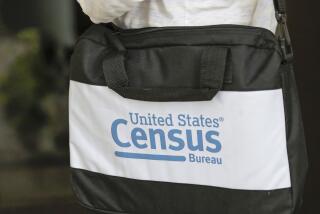Parties Spar Over Need for Census ‘Sampling’
WASHINGTON — Several Republicans are questioning whether the Census Bureau should release a second population count--this one more politically sensitive--to account for historically undercounted groups that may have been excluded from the figure released this week.
That additional count, to be adjusted using a statistical method known as “sampling,” could be pivotal for those states that must redraw their congressional district lines after Thursday’s release of the initial figures used to redistribute the 435 House seats, which must occur every 10 years.
There were 281,421,906 people living in the United States on April 1, the first Census 2000 results showed, more than 5 million more than a previous estimate based on the 1990 count.
Census Director Kenneth Prewitt said the 281-million figure was also slightly higher than a separate preliminary demographic analysis used to measure the count’s accuracy. He stressed, though, that the higher figure did not mean the bureau counted every person in the country.
Thus, some believe there’s a need for sampling, although political-party members are divided about its use.
Democrats say the adjustment is necessary to account for traditionally undercounted groups--the poor, rural residents, minorities and children.
Some Republicans believe sampled data could leave the party at a disadvantage during redistricting, when states redraw their congressional district lines. Republicans, in general, also contend that a traditional head count is most accurate and say Thursday’s numbers prove it.
“Counting real people is more accurate than a computer model,” Rep. Thomas M. Davis (R-Va.), chairman of the National Republican Congressional Committee, said Friday. Davis added that he thought the GOP could gain 10 to 14 seats in 2002 as a result.
Chip Walker, spokesman for Rep. Dan Miller (R-Fla.), chairman of the House Government Reform Committee’s census panel, said there’s still “very legitimate scientific debate as to whether sampling will increase or decrease the accuracy of the census.”
But Steve Jost, a spokesman for census director Prewitt, said: “For anybody today to talk about no need for adjustment, they are just glossing over the real issue. Until we get results from the sampling survey, it’s all speculation.”
Tom Eisenhauer, spokesman for Texas Rep. Martin Frost, chairman of the House Democratic Caucus, said the Census Bureau should continue with its plan to release the sampled numbers. He said Republicans were “spinning another fantastic doomsday scenario.” He also predicted gains for Democrats in 2002.
“Democrats will be in excellent position to retake the House,” Eisenhauer said.
House members elected Nov. 7 will represent the area within existing districts until the 2002 election, when the new allotment of seats takes effect. In most states, the legislature will redraw congressional district boundaries.
In March, the Census Bureau will release two sets of more detailed statistics that measure county and local-level populations to be used for redistricting. One set of numbers, if approved, will be sampled; the other will be “actual,” unadjusted numbers.
Last year, the Supreme Court ruled that reapportionment must be based on the actual head count, but left it to states to decide which set of data to use for reshaping political districts.
President-elect Bush has not said whether he will support release of the sampled data. President Clinton favors releasing the figures.
At least one nonpartisan analyst, Kimball Brace of Election Data Services Inc., said Republicans may be in better shape going into redistricting because they hold more sway in state legislatures than 10 years ago. Republicans will control the House in the next Congress, 221-211, with two independents and one vacancy.
But nonpolitical factors, including compliance with federal voting-rights regulations and the threat of lawsuits, could erase thoughts of gerrymandering and make it hard to forecast which party has the upper hand, said Tim Storey, redistricting director for the National Conference of State Legislatures.
On the Net: Census Bureau Web site: https://www.census.gov
More to Read
Get the L.A. Times Politics newsletter
Deeply reported insights into legislation, politics and policy from Sacramento, Washington and beyond. In your inbox three times per week.
You may occasionally receive promotional content from the Los Angeles Times.










